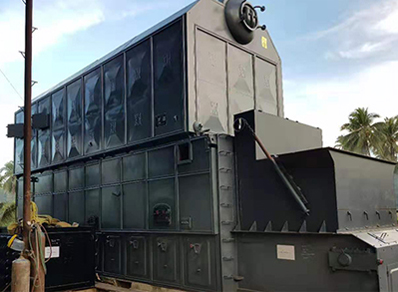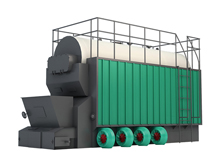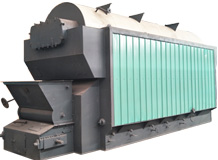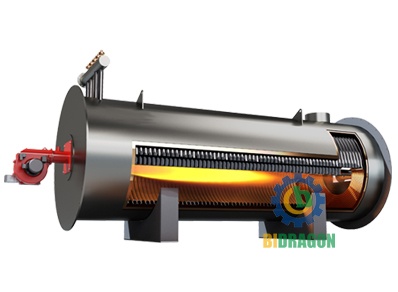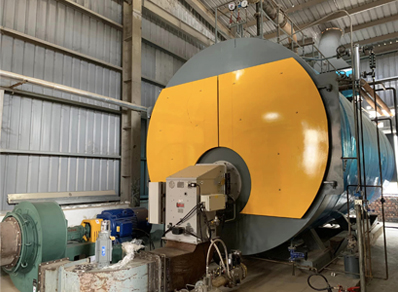
The Importance of Steam Boiler Water Treatment
Steam boilers play a vital role in industrial production and many commercial operations. A key factor that should not be overlooked to ensure the efficient, safe and long-lasting operation of steam boilers is boiler water treatment. In this article, we'll take an in-depth look at the importance of steam boiler water treatment, covering why it's necessary, what the treatment system removes, how it affects various aspects of the boiler, and the specific steps involved.
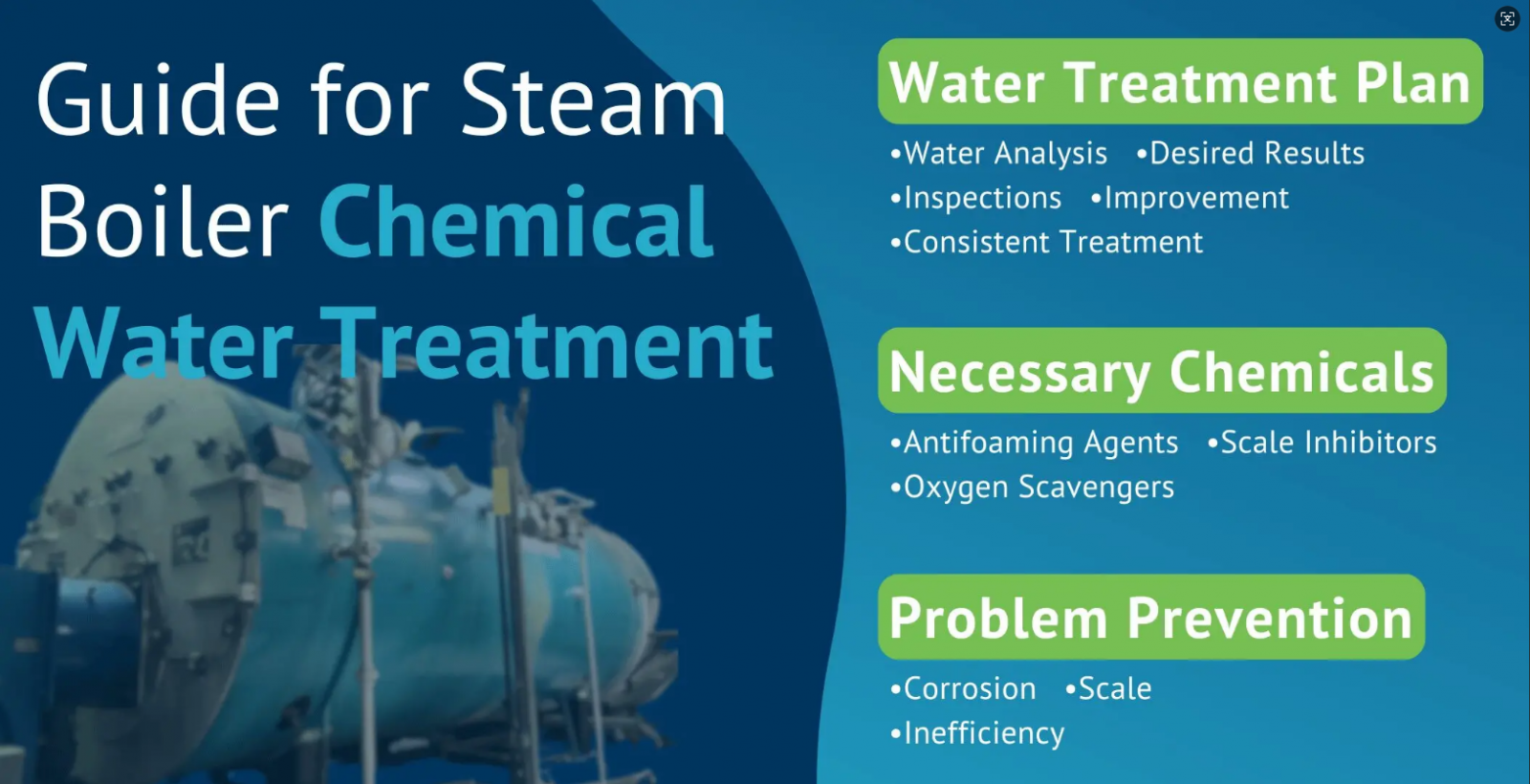
Steam Boiler Water Treatment Definition and Overview
Definition
Boiler water treatment is the process of purifying and improving the quality of the water used in a boiler system. This process is designed to remove all types of impurities from the water and regulate the chemical properties of the water to meet the requirements for safe and efficient boiler operation.
Role
The combustion process within a boiler is highly dependent on the clarity and quality of the water. High-quality water helps the boiler accomplish its core tasks: producing high-quality steam, protecting equipment from corrosion, and maintaining efficient heat exchange. If a boiler uses untreated water, the entire system can suffer from inefficiencies and permanent damage to the equipment, which can not only shorten the life of the boiler, but can also lead to dangerous situations such as explosions due to overheating.
Why You Need to Look at Both External and Internal Water Treatment
External water treatment
External water treatment is vital for large boilers that handle far more water than they can handle. It ensures that water is purified before it enters the boiler, rather than relying solely on the boiler's internal treatment mechanism. By using external water treatment equipment, the water can be initially purified at the source, removing a large number of impurities, reducing the burden on the boiler's internal treatment, and ensuring the stable operation of the boiler system.
Internal water treatment
Relatively small boilers with moderate water pressure may achieve better water purification by relying only on internal water treatment. Internal water treatment is usually carried out by adding chemicals inside the boiler or utilizing specific devices to further treat the water entering the boiler to meet the water quality requirements of boiler operation.
The Importance of professional consultation
Determining the appropriate water treatment method is not an easy task as different boilers have different sizes, uses and operating parameters. Therefore, it is necessary to consult professional water treatment experts. They can be based on the specific circumstances of the boiler, taking into account a variety of factors, tailored to the user the best water treatment program to ensure that the effect of water treatment at the same time, to avoid the wrong choice of treatment and bring unnecessary costs and risks.
Substances Removed by Boiler Feedwater Treatment Systems
Iron
Iron may be present in water in soluble or insoluble forms. Once in the boiler system, iron can deposit on boiler components and piping, not only damaging downstream equipment, but also negatively affecting the quality of products in certain manufacturing processes. For example, in the food processing or pharmaceutical industries, iron impurities can contaminate products and affect product quality and safety.
Copper
Copper can form deposits in high-pressure turbines, reducing the efficiency of the turbine's operation. This not only leads to wasted energy, but may also require costly cleaning operations or replacement of equipment components, increasing the operating costs of the business.
Silicon dioxide
In high-pressure boilers, extremely hard scale can form if silica is not reduced to low levels. This scale can seriously affect the heat exchange efficiency, increase energy consumption, and may also cause damage to boiler components, shortening equipment life.
Calcium
Depending on the chemical nature of the boiler feed water, calcium may lead to scale formation in a number of forms, such as calcium silicate and calcium phosphate. The presence of scale hinders heat transfer, reduces the operating efficiency of the boiler, and may even trigger localized overheating, posing a threat to boiler safety.
Magnesium
When magnesium combines with phosphate, it adheres to the inside of the boiler and the surface of the pipes, forming a covering. This covering will attract more solid impurities, further promoting the formation of scale and adversely affecting the normal operation of the boiler.
Aluminum
Aluminum can form scale deposits inside the boiler and may react with silica, increasing the likelihood of scale formation. This not only affects the heat exchange efficiency of the boiler, but may also lead to corrosion and reduced reliability of the equipment.
Hardness
The hardness of water is mainly caused by ions such as calcium and magnesium, which can form deposits and scale on boiler components and piping, reducing the heat transfer performance of the equipment and increasing energy consumption, as well as potentially leading to clogging of the piping and affecting the normal operation of the system.
Dissolved gases
Oxygen, carbon dioxide and other gases dissolved in the water will trigger chemical reactions and cause serious corrosion on boiler piping and components. Corrosion will not only shorten the service life of the equipment, but also may lead to leakage and other safety problems, bringing huge economic losses and safety hazards to the enterprise.
Importance of Boiler Water Treatment
Reducing Boiler Piping Decomposition
Reduced efficiency due to scale
During normal boiler operation, when water evaporates, dissolved salts in it collect on the surface of the equipment. These salts form scale, which impedes the transfer of heat from the boiler to the water, reducing the heat exchange efficiency and operational effectiveness of the entire system.
The hazards of low pH and dissolved oxygen
If the water used in the boiler has a low pH or contains dissolved oxygen, the water will directly erode the steel equipment that makes up the boiler. Over time, boiler piping can become pitted, holed or even thinned, which can eventually lead to pipe rupture and jeopardize the safe operation of the entire system.
The cost of pipe replacement
When there is too much scale in the pipes, they need to be replaced. Not only does this process cost a lot of money for new piping and installation, but it can also lead to production interruptions and additional financial losses.
Maintaining Turbine Efficiency
Impurities entering the turbine
When steam is used to drive equipment such as a turbine, if impurities in the water are not removed before entering the boiler, they can enter the turbine blades along with the steam.
Impact of deposits on the turbine
These impurities can form deposits on the turbine blades, reducing the efficiency of the turbine and triggering vibrations. Vibration not only creates noise and disrupts the working environment, it can also lead to turbine failure in the long term.
Consequences of turbine blade erosion
As turbine blades erode, their performance degrades, further reducing the overall efficiency of the system and affecting the productivity of the organization.
Reducing Overheating
Transfer of impurities in steam conversion
When impure water is converted to steam, the impurities in it adhere to various surfaces in the boiler system, forming scale and other deposits.
Effect of deposits on heat transfer
These deposits can impede normal heat transfer from the boiler because heat must first penetrate this layer of deposits before it can be transferred to the outside of the boiler. An untreated system is therefore more prone to overheating.
Advantages of purified water
The use of purified water ensures that no deposits or scale will form, allowing the boiler to continue to exchange heat properly, avoiding overheating problems and guaranteeing safe and stable operation of the equipment.
Overall Impact on the Boiler System
Higher energy costs
Scale build-up reduces the efficiency of heat transfer, requiring the boiler to consume more fuel to achieve the same steam output, thus increasing energy costs.
Frequent repairs and downtime
Corrosion and deposits can lead to equipment failure, requiring frequent repairs. This not only increases maintenance costs, but also leads to production downtime, resulting in production losses for the organization.
Shortened boiler life
Accelerated wear and tear on equipment can shorten the life of the boiler and its components, requiring companies to replace equipment earlier, increasing capital expenditures.
Compliance Issues
Strict water quality standards are a regulatory requirement in many industries, and companies must ensure that boiler water meets these standards for production safety and environmental protection. If the water quality is not up to standard, companies may face fines and other penalties that can affect their normal operations.
The Role of Water Softeners in Steam Boilers
The Problem of Dissolved Solids in Municipal Water
Water supplied from municipal water treatment plants typically contains small amounts of dissolved solids such as calcium, magnesium, and other minerals. These minerals can cause damage to the piping inside the boiler if they enter the steam boiler.
Impact of Hard Scale on Boiler Piping and Efficiency
Calcium and magnesium minerals can form hard scale on the surface of boiler piping. Not only does this impede heat transfer between the water and the piping, causing the piping to overheat, it also affects the heat exchange efficiency of the boiler and reduces the overall performance of the boiler.
How Water Softeners Work
Water softeners solve hard water problems by introducing sodium compounds into the boiler's water supply system to neutralize calcium and magnesium ions in the water.
Benefits of Using a Water Softener
Using a water softener reduces the risk of hard water scale forming inside the boiler, improves water flow performance, ensures that the boiler operates at peak efficiency, and extends the life of the boiler by avoiding equipment failures caused by scale and corrosion.
Steps in Boiler Water Treatment
Primary Filtration
Removal of impurities and large particles
In the first step of boiler water treatment, impurities and large particulate matter, such as soil, need to be removed from the water. These substances may damage the boiler equipment if they enter the boiler system.
Protection significance for the boiler system
Through primary filtration, the boiler system can be effectively protected, reducing the occurrence of wear and tear and malfunction of the equipment, and laying a good foundation for the subsequent water treatment steps.
Ion exchange softening
Removal of calcium and magnesium ions
Ion exchange softening is the second step in boiler water treatment, mainly used to remove calcium and magnesium ions from the water, which are the main cause of water hardness.
Resin bed process
In this process, a resin bed containing sodium or potassium ions is used. When hard water flows through the resin bed, the calcium and magnesium ions in the water are exchanged with the sodium or potassium ions on the resin, thus reducing the hardness of the water.
Preventing scale formation
After ion exchange softening treatment, the calcium and magnesium ion content in the water is greatly reduced, effectively preventing the formation of scale in the equipment and safeguarding the normal operation of the boiler.
Reverse Osmosis Desalination
Removing impurities and minerals
Reverse osmosis is a key step in boiler water treatment, designed to remove impurities and minerals from the water. After primary filtration, the water enters the reverse osmosis system.
Role of Semi-permeable membranes
In a reverse osmosis system, water passes through a semi-permeable membrane. Semi-permeable membranes allow only water molecules to pass through while preventing ions and suspended particles from passing through, thus effectively removing chlorides, nitrates, sulfates, silicic acid, bicarbonates, and other minerals from the water, ensuring high quality water for the boiler.
Application in different industries
Reverse osmosis technology is widely used in many industries such as drinking water production, boiler water treatment, etc. It plays an important role in guaranteeing the safety of water quality and stable operation of equipment.
Removal of Dissolved Gases from Water
Chemical addition methods
One way to remove dissolved gases from water is by adding chemicals. By adding specific chemicals to the water, a chemical reaction occurs with the dissolved gases, converting them into harmless substances or separating them from the water.
Use of deaerators
A deaerator is also commonly used to remove dissolved gases from water. It removes dissolved gases, especially oxygen, from the water by heating or other physical means, reducing the risk of corrosion to boiler piping.
Conclusion
Key Points Summary
Steam boiler water treatment covers a wide range of aspects from removing various types of impurities, regulating water chemistry, to preventing equipment corrosion and scaling. Proper water treatment reduces boiler tube breakdown, maintains turbine efficiency, reduces the risk of overheating, and improves the operational stability of the entire boiler system.
Importance Enhancement
Proper boiler water treatment is of irreplaceable importance to ensure the safe, efficient and long-lasting operation of steam boilers. It is not only related to the service life and operating costs of the equipment, but also affects the production safety and economic efficiency of the enterprise.
Call to Action
Both industrial enterprises and commercial operators should attach great importance to the water treatment of steam boilers. Timely consultation with professional water treatment experts, according to the actual situation of the boiler, select the appropriate water treatment equipment and processes to ensure the quality of boiler water, to provide a strong guarantee for the stable development of enterprises!

